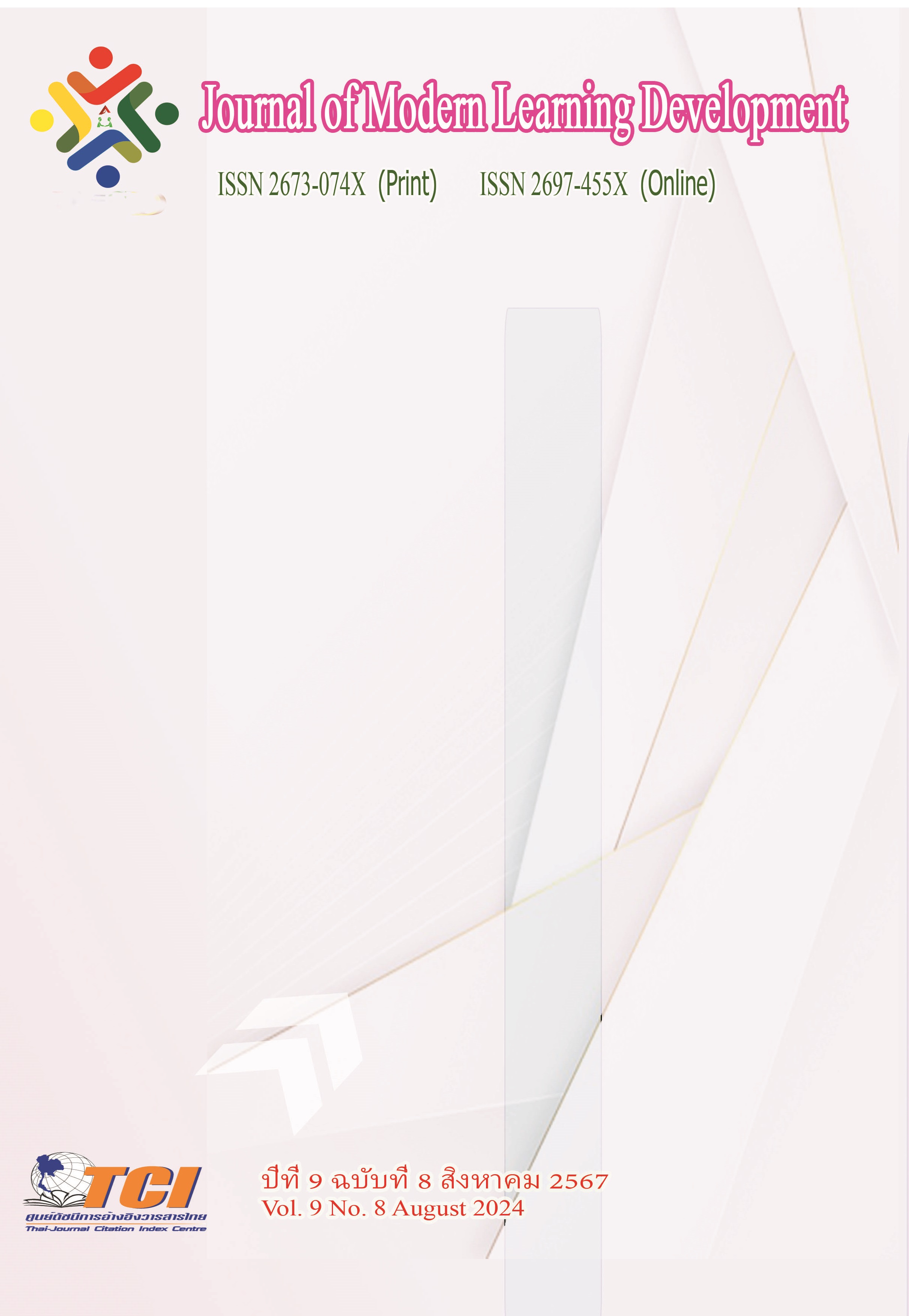Job Motivation and Organizational Commitment Affecting the Job Efficacy of Employees in Meat Processing Production Factories in Bangkok Province
Main Article Content
Abstract
The objectives of this study were to: 1) investigate job motivation, organizational commitment, and job efficacy of employees; 2) compare the job efficacy of those employees as a personal factor; and 3) investigate the effects of job motivation and organizational commitment toward the job efficacy of employees in the meat processing production factories in Bangkok province. This research was a quantitative study. Samples in the study were 382 employees of the meat processing production factories in Bangkok province using Purposive Sampling and simple random sampling to randomize these samples. The research tool in this study was a questionnaire, which was statistically analyzed by using a percentage, means, standard deviation (SD), t-test, F-test, and multiple regression analyses.
The findings of the study revealed that; 1) level of job motivation, organizational commitment, and job efficacy of employee’s factor overall was at a high level. 2) employees having different statuses, educational levels, and operating times had different job efficacy at a statistical significance of 0.05 levels. Meanwhile, employees having different sexes and ages had no difference in their job efficacy; and 3) Job motivation had an impact on the job efficacy of employees in the meat processing production factories in Bangkok province by the percentage of the predictive analytics at 67.10-82.60 (R Square=67.10, 0.826).
Article Details
References
กรมพัฒนาธุรกิจการค้า. (2565). บทวิเคราะห์ธุรกิจประจำเดือนตุลาคม 2565 ธุรกิจอารแช่แข็ง. ออนไลน์. สืบค้นเมื่อ 10 พฤษภาคม 2566. แหล่งที่มา: https://www.dbd.go.th/index.php.
กรมโรงงานอุตสาหกรรม. (2566). ข้อมูลโรงงานแยกตามพื้นที่. ออนไลน์. สืบค้นเมื่อ 10 พฤษภาคม 2566. แหล่งที่มา: https:// www.diw.go.th/webdiw/search-factory/.
ประวิทย์ เกียรติอุดมแก้ว. (2564). ความสัมพันธ์ระหว่างแรงจูงใจในการปฏิบัติงานกับประสิทธิภาพในการทำงานของพนักงานบริษัท นิวเทค เทรดดิ้ง จำกัด. วารสารการบริหารและสังคมศาสตร์ปริทรรศน์. 4 (3), 87-102.
ปัญญาภา อัคนิบุตร. (2565). แรงจูงใจที่มีผลต่อประสิทธิภาพในการทำงานของพนักงานบริษัทรัฐวิสาหกิจให้ บริการด้านท่าอากาศยาน Generation Y. สารนิพนธ์ปริญญาการจัดการมหาบัณฑิต. บัณฑิตวิทยาลัย: มหาวิทยาลัยมหิดล.
พิจิตรตรา ทับทิม และ ธัญนันท์ บุญอยู่. (2564). ตัวแบบสมการโครงสร้างของปัจจัยที่มีผลต่อประสิทธิภาพในงานของพนักงานขับรถบรรทุกในจังหวัดนครปฐม. วารสารวิทยาลัยพาณิชยศาสตร์บูรพาปริทัศน์. 16 (2), 126-139.
พิชญาภา ศิลาอ่อน. (2566). แรงจูงใจในการทำงานกับประสิทธิภาพในการปฏิบัติงานของข้าราชการ Generation Y ในจังหวัดพระนครศรีอยุธยา. สารนิพนธ์ปริญญาการจัดการมหาบัณฑิต. บัณฑิตวิทยาลัย: มหาวิทยาลัยมหิดล.
พีระพัฒน์ สมศรี และ ธัญนันท์ บุญอยู่. (2564). แรงจูงใจในการทำงานที่ส่งผลต่อประสิทธิภาพในการทำงานของพนักงานระดับปฏิบัติการของกรมชลประทานปากเกร็ด จังหวัดนนทบุรี. วารสารวิชาการมหาวิทยาลัยการจัดการและเทคโนโลยีอีสเทิร์น. 18 (1), 172-183.
เพทาย ทรัพย์กะสินธุ์. (2563). แรงจูงใจมีผลต่อประสิทธิภาพในการปฏิบัติงานของเจ้าหน้าที่ต่างประเทศสายธุรกิจนำเข้าและส่งออกของธนาคารแห่งหนึ่ง. สารนิพนธ์ปริญญาบริหารธุรกิจมหาบัณฑิต. บัณฑิตวิทยาลัย: มหาวิทยาลัยศรีนครินทรวิโรฒ.
วิจัยกรุงศรี. (2565). แนวโน้มธุรกิจ/อุตสาหกรรมอาหารทะเลแปรรูป. ออนไลน์. สืบค้นเมื่อ 11 พฤษภาคม 2566. แหล่งที่มา: https:// www.krungsri.com/th/research/industry/industry-outlook/food-beverage/processed-seafood/io/io-frocessed-seafood-20.
วิภา อ่ำกลัด. (2563). คุณภาพชีวิตและความผูกพันองค์กรที่มีความสัมพันธ์กับประสิทธิภาพในการทำงานของพนักงาในสายงานอุตสาหกรรมสิ่งทอในเขตกรุงเทพมหานคร. สารนิพนธ์ปริญญาบริหารธุรกิจมหาบัณฑิต. บัณฑิตวิทยาลัย: มหาวิทยาลัยศรีนครินทรวิโรฒ.
สถาบันอาหาร อุตสาหกรรมพัฒนามูลนิธิเพื่อสถานบันอาหาร. (2563). ตลาดอาหารสำเร็จรูปในประเทศไทย. ออนไลน์. สืบค้นเมื่อ 25 ตุลาคม 2566. แหล่งที่มา: https://fic.nfi.or.th/market-intelligence-detail.php?smid=290.
สุมาลี รามนัฏ และ ธัญนันท์ บุญอยู่. (2562). อิทธิพลของความได้เปรียบในการแข่งขันอย่างยั่งยืนที่อยู่ในฐานะตัวแปรปฏิสัมพันธ์ระหว่างการมุ่งเน้นการตลาด สู่ผลการดำเนินงานของอุตสาหกรรมอาหารทะเลแช่แข็งไทย. วารสารมหาวิทยาลัยศิลปากร. 39 (5), 145-158.
หนึ่ง กรงทอง, เอมอร ตระกูลสัมพันธ์ และพรทิพย์ ชุ่มเมืองปัก. (2563). ความผูกพันของพนักงานที่มีต่อประสิทธิภาพในการปฏิบัติงานขององค์กรในภาคอุตสาหกรรมผลิตยานยนต์และชิ้นส่วน. วารสารบัณฑิตวิทยาลัย มหาวิทยาลัยสวนดุสิต. 16 (1), 97-112.
Allen, N. J., & Meyer, J. P. (1990). The measurement and antecedents of affective, continuance and normative commitment to the organization. Journal of Occupational and Organizational Psychology. 63 (1), 1-18.
Baladraf, M. I. F., & Pogo, T. (2022). Analysis of job insecurity, compensation and covid health protocols effects on employee performance with work motivation as a mediation variable on employees of PT Panggung Jaya Indah. Saudi Journal of Business and Management Studies. 7 (1), 22-33.
Bustasar, B., Sumarsih, S., & Nugroho, K. U. Z. (2018). The relationship between motivation, engagement and performance of employee. Advances in Social, Education and Humanities Research. 295, 80-83.
Herzberg, F. (1979). The motivation to work. (2nd ed.). New York: John Willey & Sons.
Jabri, B., & Ghazzawi, I. (2019). Organizational commitment: A review of the conceptual and empirical literature and a research agenda. International Leadership Journal. 11 (1), 78-119.
Jakada, A., Jakada, M. B., Rabi, A., Hussein, M. A., & Kurawa, N. (2019). Organizational commitment and job performance: A conceptual model. Lapai International Journal of Management and Social Sciences. 11 (1), 75-82.
Likert, R. A. (1932). A technique for the measurement of attitudes. Archives of Psychology. 140, 5-53.
Peterson, E., & Plowman, E. G. (1953). Business organization and management. Chigcago: Irwin.
Puspa, I., Anton, R., Tjendana, M., & Wijaja, D. (2021). Employee performance factors influence by work motivation as between from incentives and organizational culture. Journal Mantik. 5 (2), 1275-1285.
Sarjono, H., & Yohanes, H. (2022). Employees’ performance of production division in a textile firm in Indonesia. International Conference on Industrial Engineering and Operations Management Istanbul, Turke. 7, 1910-1922.
Varma, C. (2017). Importance of employee motivation & job satisfaction for organizational performance. International Journal of Social Science & Interdisciplinary Research. 6 (2), 10-20.
Yamane, T. (1973). Statistics: An introductory analysis. (3rd ed.). New York: Harper and Row.


